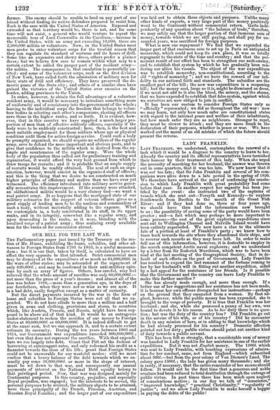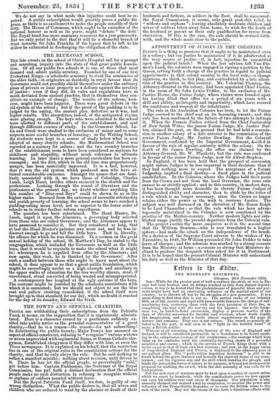LADY FRANKLIN:
Ian' Fn.8.-sxmra, we understand, contemplates the renewal of a task which it would be a disgrace to the country to leave to her. Already the country and its official representatives have tarnished their honour by their treatment of this lady. When she urged the necessity of searching for her husband, the answer was thrown out in some quarters, that it was too late. We now knoW that it was not too late ; that Sir John Franklin and several of his com- panions were alive down to a late period 'in the spring of 1850. We therefore have arrived at the point of confirming the conclu- sion to which Lady Franklin with great probability 'had come before that year. In another respect her sagacity 'has been jus- tified by the event : she instructed two of the captains of vessels which she sent out—Forsyth and Kennedy—to explore Southwards from Boothia to the mouth of the Great Fish River : and if they had done so, three or four years ago, we should have then had the information now' brought to us ; the possibility of saving some of the party would have been greater ; and—a fact which may perhaps be more important to some persons—the cost of the great exploring expeditions since sent out to Wellington Channel and Melville Island would have been entirely superseded. We now have a clue to the ultimate fate of a portion at least of Franklin's party ; we know how to trace back towards the site where they abandoned their ships, and to recover such records as they may have left. In order to make full use of this information, however, it is desirable to employ in the search competent Arctic naval explorers ; and we understand by a letter from Sir Roderick Murchison, which was to 'have been read at the last meeting of the Geographical Society, that in de- fault of such efforts on the part of Government, Lady Franklin has resolved to expend the last remnant of the fortune coming to' her by her husband's will in fitting out another expedition, aided by a last appeal for the assistance of her friends. Is it possible that the Government and the country can leave Lady Franklin to make this further sacrifice ?
She has already Made enough, and more than enough. If a better use of her suggestions and her assistance has not been made, it is because her own officers disregarded her instruotions--=perhaps on the ground that they emanated from a woman. By that ne- glect, however, while the public money has been expended, the is brought to the verge of poverty. It is true that Franklin was her husband ; and she, while she possessed a penny of her, own, was bound to devote it to his rescue. As to her duty there is no ques- tion; but was the duty of the country less ? Did Franklin go out in the service of his wife, or of his country ? Did he encounter death in any mission of hers, or in adding to that knowledge which he had already procured for his country P Domestic affection pointed out her duty; public virtue should point out another kind of duty towards a public servant.. This has been felt so strongly, that a considerable sum of money was handed to Lady Franklin for her assistance in one of the earlier expeditions. But it was not English money. The 15001. which was sent to Lady Franklin, with touching expressions of admira- tion for her conduct, came, not from England—which subscribed about 3001.—but from the poor colony of Van Diemen's Land. The colony, gave 15001.; the lady has given many thousands ; end she is ready, if necessary, that the entire remainder of her means should follow. It would not be the first time that a generous and noble creature had been reduced to total destitution through the outrage of public virtue. In past times there has been much open neglect of conscientious motive ; in our day we talk of " conscience," "improved knowledge," "practical Christianity'," "regularity of justice"; and we allow Lady Franklin to make herself a beggar in paying the debts of the public! We do not say in what mode, this injustice could best be re- paired. A public subscription would possibly prove a public dis- grace, as there is no excitement to make the people sensible of their dduty. The House of. Commons, which ought to be custodier of the national honour as well as its purse, might "debate " the debt ! The Royal hand has more summary resources for a just generosity. But we only point to the fact that it will be a shameful breach of trust towards Sir Xohn Franklin if the legacy that he left to his widow be exhausted in discharging the obligation of the state.



























 Previous page
Previous page